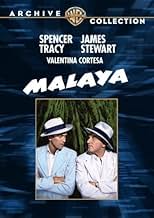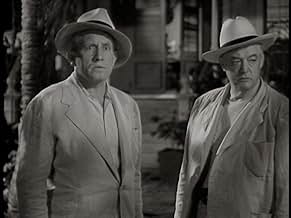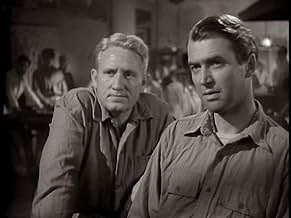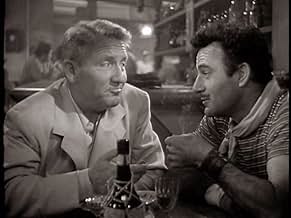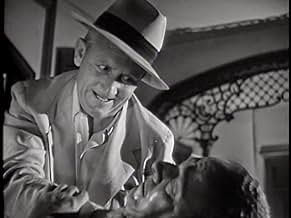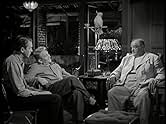CALIFICACIÓN DE IMDb
6.5/10
1.6 k
TU CALIFICACIÓN
Agrega una trama en tu idiomaNewspaperman Royer convinces government officials of a plan to obtain rubber by smuggling it out from under the Japanese. Carnahan is let out of prison to help.Newspaperman Royer convinces government officials of a plan to obtain rubber by smuggling it out from under the Japanese. Carnahan is let out of prison to help.Newspaperman Royer convinces government officials of a plan to obtain rubber by smuggling it out from under the Japanese. Carnahan is let out of prison to help.
- Dirección
- Guionistas
- Elenco
- Premios
- 2 premios ganados en total
Valentina Cortese
- Luana
- (as Valentina Cortesa)
Lester Matthews
- Matisson
- (escenas eliminadas)
Joel Allen
- Federal Agent
- (sin créditos)
Besmark Auelua
- Henchman
- (sin créditos)
George M. Carleton
- Small Businessman
- (sin créditos)
Silan Chan
- Malay Girl
- (sin créditos)
Spencer Chan
- Chinese Shipmaster
- (sin créditos)
Joseph Crehan
- Businessman with Pipe
- (sin créditos)
- Dirección
- Guionistas
- Todo el elenco y el equipo
- Producción, taquilla y más en IMDbPro
Opiniones destacadas
Malaya may seem a fantastic tale, but the story actually has quite a bit of truth to it. When World War II broke out the Japanese quickly conquered most of the rubber producing areas of the world. The modern mechanized army does run on rubber and both the USA and Germany developed types of synthetic rubber to be used.
My mother told me during World War II there were all kinds of drives for recyclable material and among the most valuable was rubber. People contributed all kinds of old tires for the war effort.
Lionel Barrymore plays the real life Manchester Boddy who was publisher of the Los Angeles Daily News who was the prime mover in the scheme you see portrayed here in Malaya. Though this story is fictional, the need for rubber in the USA was critical at the time and there was in fact a rubber smuggling operation going on.
Spencer Tracy before he came to MGM played just the kind of two fisted action heroes at Fox which was his original studio. He expressed an interest in doing this kind of film for old time sake and got cast in it. He really isn't poaching on Humphrey Bogart's territory these were the kind of roles he originally did in film while Bogey was playing hoods over at Warner Brothers.
Because the script called for a buddy team of heroes, James Stewart was approached and he even conceded top billing to Tracy. According to the Films of James Stewart, he admired Tracy as an actor so much that he was grateful just for the opportunity to work with him again. In fact Stewart's first film role was in Murder Man, a film that starred Spencer Tracy back in 1935.
With the two of these big stars in the leads, MGM was able to recruit a really outstanding group of players like John Hodiak, Valentina Cortese, Roland Winters, Richard Loo, the aforementioned Lionel Barrymore and my two favorites Gilbert Roland and Sydney Greenstreet.
Roland was shortchanged though. Watching Malaya I could tell his role as Tracy's adventurous friend was left on the cutting room floor. But even a little Gilbert Roland is always a pleasure to watch.
This was Sydney Greenstreet's last film and in it he essentially reprises the part of Ferrari in Casablanca. He's got the best lines in the film and his scenes with his cockatoo are classic. As he says, he's just a saloon keeper with an access to gossip. Which gets put to very good use.
Stewart the idealist, Tracy the cynical realist. Too bad they didn't work together more.
My mother told me during World War II there were all kinds of drives for recyclable material and among the most valuable was rubber. People contributed all kinds of old tires for the war effort.
Lionel Barrymore plays the real life Manchester Boddy who was publisher of the Los Angeles Daily News who was the prime mover in the scheme you see portrayed here in Malaya. Though this story is fictional, the need for rubber in the USA was critical at the time and there was in fact a rubber smuggling operation going on.
Spencer Tracy before he came to MGM played just the kind of two fisted action heroes at Fox which was his original studio. He expressed an interest in doing this kind of film for old time sake and got cast in it. He really isn't poaching on Humphrey Bogart's territory these were the kind of roles he originally did in film while Bogey was playing hoods over at Warner Brothers.
Because the script called for a buddy team of heroes, James Stewart was approached and he even conceded top billing to Tracy. According to the Films of James Stewart, he admired Tracy as an actor so much that he was grateful just for the opportunity to work with him again. In fact Stewart's first film role was in Murder Man, a film that starred Spencer Tracy back in 1935.
With the two of these big stars in the leads, MGM was able to recruit a really outstanding group of players like John Hodiak, Valentina Cortese, Roland Winters, Richard Loo, the aforementioned Lionel Barrymore and my two favorites Gilbert Roland and Sydney Greenstreet.
Roland was shortchanged though. Watching Malaya I could tell his role as Tracy's adventurous friend was left on the cutting room floor. But even a little Gilbert Roland is always a pleasure to watch.
This was Sydney Greenstreet's last film and in it he essentially reprises the part of Ferrari in Casablanca. He's got the best lines in the film and his scenes with his cockatoo are classic. As he says, he's just a saloon keeper with an access to gossip. Which gets put to very good use.
Stewart the idealist, Tracy the cynical realist. Too bad they didn't work together more.
I'm an American ex-pat living in Malaysia, so I thought I'd watch this to see if there were any old scenes of life in Malaysia in the late 40's. Well, as I expected, there weren't, BUT the actual movie and story were really well done and interesting.
I thought the dialog in this movie was the best I have heard from this era. I watch a lot of "noir", and this dialog was more realistic with a flair that wasn't overdone. For example, the interaction between Spencer Tracy and his girl wasn't flowery or sappy, it was kind of hip and snappy without being too "40's". Also, every line out of Greenstreet's mouth was sublime.
Casting was awesome! It seemed like everybody was perfect for their role. Greenstreet was fantastic as an almost omnipotent bar owner. Tracy was rough and rugged. Stewart was convincing as a sort-of-drifter that finally finds purpose in his life. Plus, you get a cameo of Lionel Barrymore, which is worth it's weight in gold.
This is a "feel good" movie about losers and dregs of society helping to win the war. It's tough, violent, and not everybody gets out alive. And, it's patriotic without being sappy. Watch this one on the Fourth of July, and you can't go wrong!
I thought the dialog in this movie was the best I have heard from this era. I watch a lot of "noir", and this dialog was more realistic with a flair that wasn't overdone. For example, the interaction between Spencer Tracy and his girl wasn't flowery or sappy, it was kind of hip and snappy without being too "40's". Also, every line out of Greenstreet's mouth was sublime.
Casting was awesome! It seemed like everybody was perfect for their role. Greenstreet was fantastic as an almost omnipotent bar owner. Tracy was rough and rugged. Stewart was convincing as a sort-of-drifter that finally finds purpose in his life. Plus, you get a cameo of Lionel Barrymore, which is worth it's weight in gold.
This is a "feel good" movie about losers and dregs of society helping to win the war. It's tough, violent, and not everybody gets out alive. And, it's patriotic without being sappy. Watch this one on the Fourth of July, and you can't go wrong!
If this movie did not have Jimmy Stewart and Spencer Tracy, the film wouldn't have even merited a score of five. It was a very uninspiring and forgettable wartime film made several years after the war actually ended. It just seemed like all the energy was missing from the film. In fact, about the only energy came from Sidney Greenstreet's pet bird--now that bird can act! Another problem with the film is the idea of casting Spencer Tracy in the role of a selfish, devil-may-care smuggler in Alcatraz at the beginning of the film. The believability of the performance didn't improve once he made it to Malaya. This is actually the sort of role I might have expected for Clark Gable or maybe even Errol Flynn (yes, I know he was with a different studio), but for Tracy, an actor who often was cast as the priest or nice guy, it just wasn't terribly convincing. Plus, he just acted too nice to be as seedy as they described him as being.
In the end, the only interesting thing about this film is how so much money was spent on the cast and so little bang was achieved for MGM's buck. This is purely a time-passer or film for those devotees of Stewart or Tracy.
In the end, the only interesting thing about this film is how so much money was spent on the cast and so little bang was achieved for MGM's buck. This is purely a time-passer or film for those devotees of Stewart or Tracy.
(Version reviewed is the 90-minute German-language showing on ARD on July 5, 2001.)
There are two rather unbecoming aspects about this movie, one being its blunt nationalism, the other one its odd casting. Where you would have expected, say, William Holden as the daring journalist and, well, Humphrey Bogart as the cynical hotshot, you get Jimmy and Spence. It's not that they don't act well, but the rôles just don't seem to fit. What a difference with handsome Mexican Gilbert Roland who is chosen perfectly (as Romano).
Journalist Royer (Stewart) gets his rival/friend Carnaghan (Tracy) out of prison with help from official sides (fine thesping by John Hodiak) for the good of the nation, that is, to haul all possible rubber out of British, but Jap-occupied, Malaya for the United States. Of course, the European land-owners give all assistance possible to support the sacred case, including a voluntary beating that Ian MacDonald gets from Tracy. America's raw nationalism was curiously carried right into the German translation: dubious Bruno Gruber (played by "Charlie Chan" Roland Winters) is named Marty Robber (or so) in German dubbing version of 1955, because a badman just couldn't have a German name to German audiences... This should be worth a correction, although the forgery effect is not as high as in the original 1952 dubbing of "Casablanca", that was corrected in a new version as late as in 1968. (Stewart, by the way, is synchronized well by Eckart Dux this time, not by regular Siegmar Schneider.)
Although film's humour is well-measured, it cannot conceal, but rather contributes to, the dare-devil chauvinism, four years after the war ended. Tracy played something of a contrary rôle in "Bad Day at Black Rock", as regards the U.S. relationship to the Japanese.
There's a lot of epigonism of "Casablanca", though not as much as in its immediate successors, in "Malaya". We have Richard Loo's Col. Tomura marching into the bar like Maj. Strasser; Italy's Cortese in the European female part (the story might have done without her, were there not some nice dialogues with Tracy); and the wonderful Sydney Greenstreet, who somewhat resumes his Senor Ferrari rôle (that parrot of his is a blue one, I suppose).
Despite this emulation, Frank Fenton's screenplay has something interesting about it that makes this movie agreeable after all. But it wouldn't have taken the famous leading players, close to miscasts, for something that appears like an MGM "B" production to me. - Worst thing is, I couldn't spot DeForest "Bones" Kelley anywhere around, although he is said to be there.
There are two rather unbecoming aspects about this movie, one being its blunt nationalism, the other one its odd casting. Where you would have expected, say, William Holden as the daring journalist and, well, Humphrey Bogart as the cynical hotshot, you get Jimmy and Spence. It's not that they don't act well, but the rôles just don't seem to fit. What a difference with handsome Mexican Gilbert Roland who is chosen perfectly (as Romano).
Journalist Royer (Stewart) gets his rival/friend Carnaghan (Tracy) out of prison with help from official sides (fine thesping by John Hodiak) for the good of the nation, that is, to haul all possible rubber out of British, but Jap-occupied, Malaya for the United States. Of course, the European land-owners give all assistance possible to support the sacred case, including a voluntary beating that Ian MacDonald gets from Tracy. America's raw nationalism was curiously carried right into the German translation: dubious Bruno Gruber (played by "Charlie Chan" Roland Winters) is named Marty Robber (or so) in German dubbing version of 1955, because a badman just couldn't have a German name to German audiences... This should be worth a correction, although the forgery effect is not as high as in the original 1952 dubbing of "Casablanca", that was corrected in a new version as late as in 1968. (Stewart, by the way, is synchronized well by Eckart Dux this time, not by regular Siegmar Schneider.)
Although film's humour is well-measured, it cannot conceal, but rather contributes to, the dare-devil chauvinism, four years after the war ended. Tracy played something of a contrary rôle in "Bad Day at Black Rock", as regards the U.S. relationship to the Japanese.
There's a lot of epigonism of "Casablanca", though not as much as in its immediate successors, in "Malaya". We have Richard Loo's Col. Tomura marching into the bar like Maj. Strasser; Italy's Cortese in the European female part (the story might have done without her, were there not some nice dialogues with Tracy); and the wonderful Sydney Greenstreet, who somewhat resumes his Senor Ferrari rôle (that parrot of his is a blue one, I suppose).
Despite this emulation, Frank Fenton's screenplay has something interesting about it that makes this movie agreeable after all. But it wouldn't have taken the famous leading players, close to miscasts, for something that appears like an MGM "B" production to me. - Worst thing is, I couldn't spot DeForest "Bones" Kelley anywhere around, although he is said to be there.
There is a scene that makes the whole picture worthwhile (although it is otherwise pretty ordinary):
Sydney GREENSTREET is entering a room after app. 2/3 of the movie, where Spencery Tracey has just been "treated kindly" in an "interview", Greenstreet is sweating (as always), sitting down and looking at the molestor of Tracy, then says (roughly): "If you say this was necessary, then of course it was necessary, but wasn't that much for a bottle of poor booze?". The officer say: "But he broke our rules". Greenstreet: "A man who drinks and then doesn't break any rules is no man. Drinking and making troubles goes together, this is also a rule." What a line !! Officer: "I love your logic." Of course these are not exactly the lines from the picture, cause I saw the German dubbed version and re-translated them, but they can only be better in the English version.
Hilarious! Tape it, when shown on TV next time and get to that scene, it is just great!
Sydney GREENSTREET is entering a room after app. 2/3 of the movie, where Spencery Tracey has just been "treated kindly" in an "interview", Greenstreet is sweating (as always), sitting down and looking at the molestor of Tracy, then says (roughly): "If you say this was necessary, then of course it was necessary, but wasn't that much for a bottle of poor booze?". The officer say: "But he broke our rules". Greenstreet: "A man who drinks and then doesn't break any rules is no man. Drinking and making troubles goes together, this is also a rule." What a line !! Officer: "I love your logic." Of course these are not exactly the lines from the picture, cause I saw the German dubbed version and re-translated them, but they can only be better in the English version.
Hilarious! Tape it, when shown on TV next time and get to that scene, it is just great!
¿Sabías que…?
- TriviaSydney Greenstreet's final film.
- ErroresOne scene features wild chimpanzees. Chimps are natives of Africa, not Malaya.
- Citas
John Royer: You have to remember, this guy's a German.
Carnaghan: Yeah, but he's a greedy man, and greed has a nationality all its own.
- ConexionesEdited from Fuimos los sacrificados (1945)
- Bandas sonorasBlue Moon
(uncredited)
Written by Richard Rodgers and Lorenz Hart
Performed by Valentina Cortese (as 'Luana'), also whistled by James Stewart
Selecciones populares
Inicia sesión para calificar y agrega a la lista de videos para obtener recomendaciones personalizadas
- How long is Malaya?Con tecnología de Alexa
Detalles
- Fecha de lanzamiento
- País de origen
- Idioma
- También se conoce como
- Operation Malaya
- Locaciones de filmación
- Productora
- Ver más créditos de la compañía en IMDbPro
Taquilla
- Presupuesto
- USD 2,396,000 (estimado)
- Tiempo de ejecución1 hora 38 minutos
- Color
- Relación de aspecto
- 1.37 : 1
Contribuir a esta página
Sugiere una edición o agrega el contenido que falta

Principales brechas de datos
By what name was Malaya (1949) officially released in India in English?
Responda
